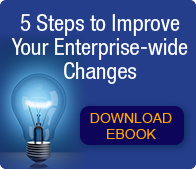If you are part of a project team assigned to enterprise-wide change you will need to have Change Agents to support the implementation. Yes, members of the project team will likely be Change Agents, but you will need to build a network as well.

These Agents must be individuals with trust and credibility of both Sponsors (leaders who must reinforce the change) and Targets (those people who are impacted by the change.) The success of your change will depend on having the right Agents, with the right skills, traits, and characteristics working with Sponsors in an established change structure.
Change Agent Strategies to Speed Enterprise-Wide Change
Here are 9 strategies for getting the most value from your Change Agents.
Strategy 1: Educate Sponsors that the quality of Agents directly impacts implementation success.
One of the most common and basic mistakes we see in our change management consulting work is when Sponsors select individuals to be Change Agents who are technical experts rather than considering the whole package. It's not just about subject matter expertise! We need people who have the kind of inter-personal skills to build relationships, and who also have the courage to confront the difficult situations that are inevitable in complex change.
Strategy 2: Build Agents' belief in the outcome of the project. Treat Agents as Targets first.
While it may initially seem counter-intuitive that someone who is selected to implement a project doesn't believe that the project will be successful, we see this phenomenon many times in our own change management consulting. Several years ago, we were leading a Project Planning Workshop for a technology implementation, and the consultant sensed that the Change Agents did not believe the project would be successful. He asked the team to line up on either side of the room, with the believers on one side, and the non-believers on the other. There were more people on the non-believer side! That's a problem, and it needed to be addressed before we could move to the other work!
Strategy 3: Identify the scope of the change early, emphasizing organizational impacts.
There is still a "ready. fire. aim" approach in many project teams, and as a result, the front-end planning is short-changed. The reason to focus on organizational impacts is simple-- it will give Change Agents insights early-on where to anticipate the most resistance. Remember the principle, "Resistance is not based on whether the change is positive or negative. Resistance is a function of disruption." {Tweet This} The more impact, the more disruption, the greater the chance for resistance to change.
Strategy 4: Identify and align rewards for Agents.
Agents need to be reinforced, too! Remember that rewards need to be in the Frame of Reference of the recipient. Rather than guess what will be meaningful, ask! We once worked with a project manager in our change management consulting who met individually with each member of the project team to find out simple things like--
- What's your favorite candy bar?
- What restaurant do you like to go to when you have something to celebrate?
- What's your favorite drink at work?
- What's your favorite drink outside of work?
She then used this information throughout the project for big and small rewards that would be individually meaningful!
Strategy 5: Provide opportunities for informal and periodic Sponsor contact.
Effective Change Agents need to have contact with Sponsors. Informal contact helps to build a relationship of trust. At the end of the day, that's what Sponsors care about in a Change Agent. Is this a person I can put my trust in?
Strategy 6: Invest in Agents' skill development.
Even when Agents have the right personal characteristics, there is a need to have specific skills and knowledge. For example, Agents should have access to tactics to manage resistance and strategies for Sponsor contracting. The investment in appropriate change management training will pay off for the current change, and for future changes.
Strategy 7: Make the Agents' assignment a full time job when possible.
25% of 4 people does not really equal one full-time Change Agent. When you have people devoting small portions of time to transformational change, or complex enterprise-wide change, you end up spending a lot of time keeping people up-to-date on what happened. It's simply not efficient.
Strategy 8: Plan for Agent succession. (Not if, but when).
We tell Change Agents to plan for the fact that Sponsors will change roles over the course of a project. The same is true of Change Agents. It's a reality in today's organization that Change Agents will come and go over the course of a project, particularly a multi-year transformational change. Plan for how you will transition people into the role.
Strategy 9: Develop Agents in all involved organizations.
One of the first things we do in our own change management consulting is to develop a change structure that includes identifying Agents in all areas of the organization that are going to be impacted by the change. This network of Agents is essential to implementation success. Implementation takes place at the local level, so local Change Agents are needed!
9 strategies. 9 ways you can accelerate your enterprise-wide changes.


